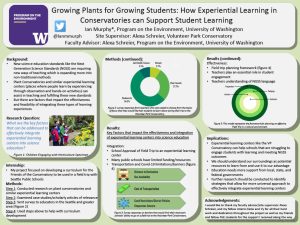Growing Plants for Growing Students: How Experiential Learning in Conservatories can Support Student Learning
With the implementation of new science education standards such as the Next Generation Science Standards (NGSS), it is challenging for schools and teachers to effectively teach in a way that fulfills these new standards. Many schools are also struggling to engage students with learning which is inhibiting their intellectual growth. By bringing students to experiential learning centers, this helps enhance students’ learning and improves academic performance while fulfilling new science education standards. The aim of this study was to identify factors that play into school board approval for proposed field trips to experiential learning centers, and apply what was learned to a curriculum for the Friends of the Conservatory (FOC) at the Volunteer Park Conservatory. To accomplish this goal, I conducted an analysis of case studies pertaining to experiential learning in nature/outdoor settings and an analysis of scholarly articles that focus on teaching pedagogy, education reform and stakeholders involved, and NGSS and its implications. In constructing the curriculum, my group and I examined other learning centers and education programs they implemented and conducted a survey for teachers in and around the Seattle area. My findings supported the reasoning to utilize experiential learning centers as learning tools because of the positive learning outcomes of students as a result, and revealed the obstacles to education reform, especially in regards to NGSS and how this utilization can help in overcoming those obstacles. These results are important because it supports the fact that experiential learning not only helps schools teach and engage students with new science education standards like NGSS, but also shows considerations experiential learning centers themselves can make when developing a curriculum.
